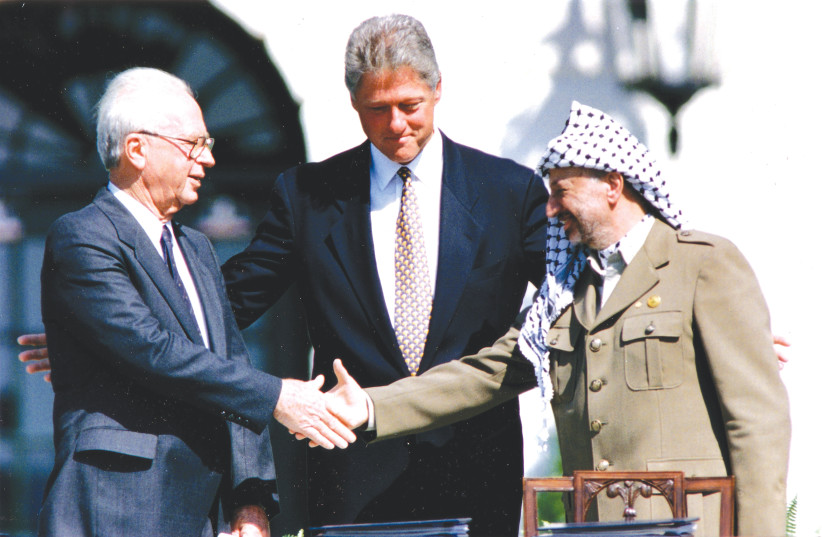New Nakba: Oslo led to Israeli apartheid over occupied Palestinians – opinion
The Oslo Accords, the first of which was signed between Israel and the Palestine Liberation Organization in September 1993, were meant to launch a five-year interim period, after which a comprehensive peace agreement would be reached.
Now, with that interim period having come and gone six times over, it is time to stop and admit that the Declaration of Principles signed at the White House 30 years ago has become a new catastrophe for the Palestinians.
This new Nakba (Arabic for “catastrophe”) divided the West Bank into three areas, with Area C fully controlled by Israel, and Areas A and B as Palestinian enclaves. The number of settlements and settlers has tripled, the ground is ripe for annexation, and east Jerusalem is totally isolated from the rest of the occupied territories.
If settlement growth has been the worst result of the Oslo Accords, the fate of Jerusalem is the second worst. In the last 30 years, the 350,000 Palestinians living in Jerusalem have been totally separated from their surroundings. Using the Oslo Accords as an excuse, Israel has legally, politically, and financially, with the help of a 25-foot-tall cement wall, left Palestinian Jerusalemites as political orphans.
Whether it was due to the assassination of prime minister Yitzhak Rabin in 1995, the lack of resolve of the negotiators, or the shortcomings of the text itself, the Oslo process has failed. Its most basic failure started on the macro level, by redefining the Israeli occupation, using a strange legal and military framework that treated a powerful army and a growing Jewish settler movement as superior to the Palestinians living in their land. Rather than leading to an amicable divorce that would give the two parties independence and freedom from each other, this process has resulted in a messy cohabitation in which one party dominates the other and two different sets of laws are applied based on ethnicity.

From day one of the talks, the Palestinian negotiators in Washington complained that the most important elements missing from the Declaration of Principles were a settlement freeze and a mechanism to ensure that the five-year interim period did not become the status quo.
Thirty years later, there are no negotiations or any sign that either marriage or divorce will be the outcome of this complicated relationship.
There is no end to the Israeli-Palestinian conflict in sight
A divorce would mean an end to the occupation and the creation of an independent Palestinian state, while a marriage would merge the two peoples into one state, with all citizens having equal rights.
The absence of a divorce and the total rejection of marriage has led to apartheid. In the territories occupied in 1967, 5 million Palestinians live under a combination of military and quasi-civil law, while 700,000 Israeli settlers live under full civil law with additional privileges.
Claims by Israel that the status of the occupied territories is still negotiable, apart from the enlarged city limits of east Jerusalem, have been a joke. The last time any negotiations or even discussions of principles took place was in 2014. Three US presidents have resided in the White House since the last time Israeli and Palestinian negotiators met.
With no negotiations and no political horizon, it is no wonder that Palestinians are choosing to revolt in various ways. Fifty-seven years since Israel broke the international consensus against taking land by force, it has not made the simple decision of what it wants to do with the areas it occupied against the will of their indigenous inhabitants.
Seeing as the Oslo process has failed miserably to provide Palestinians and Israelis with a clear road map for a solution, it is incumbent on the people of this wretched land, falsely called holy, to make up their minds about what they want to do. Using the analogy of marriage and divorce, this current messy cohabitation seems closer to rape, with the side controlling the guns refusing to end the relationship.
While we remember bitterly the happy days of the Oslo Accords signing, perhaps the most refreshing development since has been the recent protests in Israel against judicial overhaul. While these Israeli protests have focused mostly on domestic policies and the role of the Supreme Court, the fact that they are centered on the concept of the rule of law gives some hope. People can dream that this newly realized Israeli people power will also translate into a serious discussion about the occupation and the future of relations between Israelis and Palestinians.
Thirty years after Oslo, the choice is clear. Either an amicable divorce, giving both sides independence and freedom from each other, or an agreed marriage with equal rights and responsibilities. Anything short of that, such as these catastrophically toothless Oslo Accords, is doomed to fail.
Daoud Kuttab is an award-winning journalist and former Ferris Professor of Journalism at Princeton University. Kuttab is the deputy chair of the Vienna-based International Press Institute, a regular columnist with the Washington-based Al-Monitor, and a reporter for Arab News. He is the director-general of the Amman-based Community Media Network which manages Radio Al Balad and the Ammannet news site. Kuttab was born in Jerusalem and is a graduate of Messiah College in Grantham, Pennsylvania. Follow him on X @daoudkuttab.





Comments are closed.